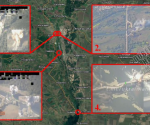US operation to remove Assad’s Russian protection ends in fabulous failure
Amongst the analysts, corporate-media or otherwise, there is still quite a lot of puzzlement about Trump’s attack on Shayrat airbase. Of course the state controlled apparatus is convinced that it was a response to a chemical weapons attack – or rather, it wants to convince its consumers that that was the purpose. This crowd, as certain as it is now will nevertheless grow confused. It is fearless of Russia on behalf of the readership that its masters want to have die in a war, and undoubtedly as the months go by, and Trump does nothing else to stand up to the “evil” Putin and depose the “dictator” Assad (which is what we should expect will happen unless certain circumstances change), then puzzlement – or perhaps frustration – will come. In the alternative media, in those parts where there is either denial for an agenda, or, less likely, denial by cognitive dissonance, the attack was a message to China, or a deliberate pulling of punches, or an attempt to destroy those chemical weapons that Assad had not yet surrendered (this last one an especially fanciful whopper from a certain competition-averse giant-of-an-organisation that punters have foolishly allowed to dominate alternative media). Naturally, there is an element that rushes to blame Israel (Trump was just pulled on a string), but there is also a sensible element of alternative media that can see that the act was disjointed, and erratic, coming out of nowhere – at least according to Trump’s genesis as a president – but also going to the same place. Just what is Trump’s strategy – does he even have one?
The answer is surely this (and people need to adjust to what it tells them about the MAGA President): the US Government – now under the stewardship of Trump, but still the same old lying and cheating crook – was hoping to lop the Syrian branch away from the protective Russian bough so that, isolated from its life-giving roots, it would wither up, dry and become tinder wood that Trump could throw on the dwindling PNAC bonfire. Unfortunately, for Trump and the US Government, it turned out that the axe wielded to perform the surgery wasn’t the sharpest tool in the box – which is not only a metaphor for a humiliating military failure, but also for the apparent stupidity of the people who planned the operation and who thought that getting the White Helmets to stage yet another catastrophe to blame on the Syrian Government, despite the uncommonly common knowledge about their particular role in the war against Assad, could fool or shame the Russians (indeed, Russian Foreign Minister Lavrov made an especial post-attack reference to them as “infamous swindlers”).
There has been a big development since the attack on Khan Shaykhun, and the subsequent retaliatory cruise missile strike, was first dealt with at FBEL (read here). Previously the author agreed with a theory that the Russians had proffered, to wit a Syrian air plane had inadvertently hit an al-qaeda chemical store which had then created a dispersal of poison to kill a large number of civilians (70). More evidence, and events of the intervening period, have altered the author’s thinking, and not just on one aspect of the episode as a whole (as this article attests to). Thanks to the work of Professor Theodore Postol of MIT, it begins to look like the chemical agents at Khan Shaykhun had been released on the ground to coincide with a Syrian air attack with the intent to make it appear as if there had been an airborne chemical weapon assault.
That the aftermath of a Syrian air raid was a fabricated event provides a very neat explanation for the Trump administration’s rush to retaliation (as it does for the possibility that Trump dismissed evidence that didn’t support the action he wanted to take – as speculated upon here). A fabricated scene of barbaric savagery implicating Assad meant that there could be no delay in which to have an investigation to prove Syrian armed forces’ innocence. Most damingly, it also suggests there was Trump administration involvement with the creation of the pretext. Indeed, if a plan to alienate Russia from Syria was executed, as the author suspects it was, then it would have specifically required a horrific and inhuman element that would put pressure of Russia to distance itself from Syria – i.e. the supposed chemicals weapons attack. This “attack”, then, would indicate initial motivation coming from the US.
Furthermore, we can detect that something was going on in the coordinated rhetoric being used by the Trump administration; this constituted phase three of the plan by the author’s reckoning. For instance, this is what Trump’s National Security Advisor, Lt General McMaster said on 9th April during an appearance on Fox News:
Russia should ask themselves, what are we doing here? Why are we supporting this murderous regime that is committing mass murder of its own population and using the most heinous weapons available … Right now, I think everyone in the world sees Russia as part of the problem.
On the 11th April, the Secretary of State, Rex Tillerson, attending a meeting of foreign ministers from the Group of Seven industrialized nations, was reported as saying that Russia must “choose between aligning itself with the United States and other Western nations or Syrian President Bashar Assad, Iran and the militant group Hezbollah.” Here’s some more from Tillerson, from the same event:
We want to create a future for Syria that is stable and secure… Russia can be part of that future and play an important role or Russia can maintain its alliance with this group which we believe is not going to serve Russia’s interest longer term.
Then on April 12th, during a press conference after a meeting with Lavrov in Moscow, Tillerson said this:
The world’s two foremost nuclear powers cannot have this kind of relationship.
If the reader can detect a note of desperation in this last example, it shouldn’t be a surprise; by the time it was uttered, the Trump administration should have understood that Russia was not going to desert Syria. Already, at the G7 meeting, the UK and US (although the prime mover on the surface was the UK) had failed to garner a united front to push for more sanctions against Russia. This was characterised as “leaving the US-UK plan to pressurise Vladimir Putin in tatters”, and it was very significant because this pressure was supposed to arm Tillerson when he met Lavrov in Moscow. Moreover, before the G7 meeting (9th April), Boris Johnson’s withdrawal from his own Moscow appointment – apparently done in protest – had drawn scorn and mockery from Russia.
The final proof that Russia had not been hectored into submission was evidenced by a veto of a UN draft resolution introduced by the UK that assumed Syrian guilt, but was superficially about instigating an investigation so that Russia could be demonised if it did apply its veto. As he introduced this resolution, Matthew Rycroft, the former Private Secretary to Tony Blair and the sitting UK envoy (these people never stop being dangerous), applied the same tack as seen above, accusing Moscow of siding with “a murderous, barbaric criminal… rather than with their international peers.” Moscow vetoed the resolution all the same, with the Russian ambassador basically implying that Rycroft, who was addressed as if he were a child, was a trouble-making coward. Boris Johnson was suitably dismayed.
What is very clear amongst all of this is the psychology employed by the USA and the UK government(s) – one could call it a grand confidence trick – in order to try to get Russia to capitulate. The completeness of the failure of this conniving was represented by the united front shown by Russia, Iran and Syria when their respective foreign ministers met and demanded that the US carry out no more strikes on Syrian forces.
So, what had gone wrong for the US/UK – and most importantly, for Trump? The simple answer is that the Russian government now seemed to fully understand its own peril – this is shown in the way the Russians have started openly calling out the US and UK for their mendacity. It’s quite amusing, actually, that it’s at the very point that the US and UK are using the “we come in peace” promise to ferret out their enemy (a la “Mars Attacks!”) that the Russians have cottoned on to the fact that it would be more dangerous to give Syria up than not to.
Additionally, the Russians were undoubtedly encouraged by the cataclysmic failure of the second phase of the Trump administration’s grand plan – which was the cruise missile attack. While the first phase – the chemical weapons atrocity – and the third phase – the diplomatic confidence trick – was meant to shame and browbeat Russia, the second phase was meant to physically intimidate.
Before we get on to that failure, let’s look at how we can understand that the military strike and certain ramifications prove the plan that the author thinks was attempted. It all hinges on the way that Russia suspended the Memorandum of Understanding whereby it and the USA can operate militarily in Syria without any accidental or mistaken engagement. The US must have anticipated that the Russians would react by cancelling the agreement – they would have been supremely arrogant and stupid if they had not accounted for it. This means that the loss of the accord as a consequence of the US attack didn’t matter for a US vision of Syria going into the future. And indeed the absence of a “deconfliction” accord would not have mattered if the Russians had decided to leave Syria hanging in the breeze. In addition to this, we have a good idea that, as things transpired, Rex Tillerson had to go to Lavrov and Putin with cap in hand to try to get the Memorandum reinstated. And we get a very good idea that the US have been stymied by the new circumstances via the comments of a spokesman for the US-led coalition operating in Syria:
You know, we have made adjustments to our operations to account for the, you know, the potential tensions that resulted from the strikes that were conducted because of the Syrian regime’s chemical attacks… I’m just not going to be able to get into the day to day reporting of the status of deconfliction. We’re just not going to do that.
So, all this is would be very humiliating for the Trump administration, and it must surely be safe to say that Russian backbone was not anticipated. The people who launched the cruise missile strike on Syria, with much hubris and delusion, thought it would make the Russians keel over – and they certainly didn’t think they would be pleading with Lavrov and Putin so that they could cling on to their little foot hold.
Therefore, the Trump administration plan would have had to have been relying on a very impressive demonstration of fire power. But for some reason this did not materialise beyond the firing tubes on a couple of boats in the Mediterranean. The Russian Defence Ministry had this to say about the effectiveness of the 59 cruise missiles that were launched at Shayrat airbase:
If 59 Tomahawk cruise missiles were not launched from hundreds of miles away, but instead dropped on Shayrat in one pile from air balloons, the effectiveness of such a ‘strike’ would be equal in cost (over $100mn) and strike accuracy.
Stop for a moment and appreciate the level of mockery being offered here. The Russian Ministry of Defence is saying that the US might as well have deployed World War I technology for all that was accomplished. To rub it in, the Russians also reminded of their own previous extremely effective cruise missile attacks on terrorists – one example written about here under the headline “Russia Is Really Just Showing Off in Syria at This Point”.
After the American missiles had been launched, the Russians had been quick to tell the world that only 23 of them had reached the Syrian airfield, and the fact that it was operational again only hours after the event seems to lend credence to the claim. Moreover, it now appears, as far as the author can see, that rumours of the base being evacuated ahead of the strike first appeared in American media – perhaps as early excuse making.
The following is an extract from a report that has a timestamp of just past midnight Eastern Time on 7th April – so on the Friday morning a few hours after the attack was launched, and it is extremely dodgy.
Dozens of Tomahawk missiles struck the air base near Homs, damaging runways, towers and traffic control buildings, a local resident and human rights activist living near the air base told ABC News via an interpreter.
It would certainly make sense for the US Government to start introducing elements into the story that would rationalise an ineffective mission as “shooting at an empty field” if that mission had indeed been the unmitigated disaster that the Russians claimed it had been. But look how early this rationalisation is being rolled out. It would suggest that the US Navy knew of its ignominy quite soon. The popular explanation in alternative media for any failure of these missiles is Russian electronic jamming technology. Conventional air defences might risk an escalation, but surely unconventional weapons would go unreported by the US military because it wouldn’t like to admit a very significant inferiority in capability that had very wide reaching implications.
What a shock, then, had been received by Team America on the 6th April? We can well guess. Phase three of the plan – the diplomatic psychology – would already be dead in the water, and yet it was still executed; we should never underestimate the hubris of the globalist cabal in London and Washington. However, it wasn’t long before the Trump administration started to make noises that indicated a reversal of its position: “we’re not going into Syria” (although Assad was still very evil).
All in all, a spectacular failure, with buckets of humiliation collected along the way – but of course, all unfailingly and masterfully covered up by the arm of US and UK Intelligence that constitutes the corporate-media. However, any respite for Syria won by Trump’s set back will surely be temporary and fleeting. Trump is a globalist – a vampire, and his administration will want to suck on Syrian blood; expect more deceptions, more scheming, more mercenaries into Syria, more terrorism in the West. The Russians and their allies still have a long fight ahead of them.


















